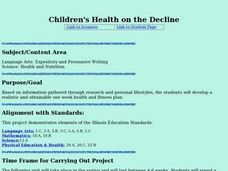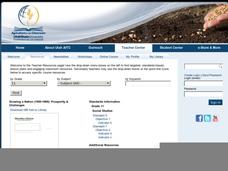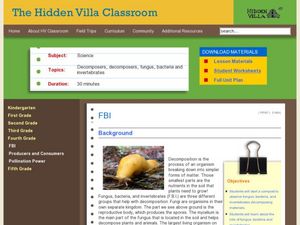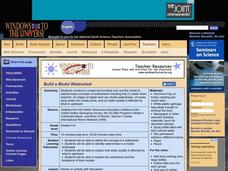ARKive
Dinner at the Reef
Fine dining can happen anywhere, even in the coral reefs. Budding environmentalists explore marine food chains, predator-prey relationships and the importance of a balanced ecosystem. These important concepts are facilitated through a...
Baylor College
The Variety and Roles of Microbes
Mini microbiologists play a card game in which they group microorganisms by groups: virus, fungus, protist, or bacteria. Then they identify the roles different microbes play in the natural world and explore how humans effectively use...
NOAA
Ocean Layers II
Now that you know the ocean has layers, let's name them. The seventh installment of a 23-part NOAA Enrichment in Marine sciences and Oceanography (NEMO) program covers terminology associated with ocean layers, such as thermocline and...
Curated OER
Penguins Around the World
Students investigate penguins. In this Science lesson, students compare and contrast penguins to flying birds. Students use a Venn diagram to illustrate the differences and similarities of penguins and flying birds.
Curated OER
Design a Reef!
Using a miniature coral reef aquarium kit, young ecologists model this unique ecosystem. They research various coral reef organisms and their niches, and they culminate the project by working together to write a report. Use this activity...
Curated OER
Semipermeable Membranes and Bioaccumulation
Beginning biologists place a drop of food coloring into water of differing temperatures to observe the effect on the diffusion rate. They remove the shells from raw eggs and then experiment with osmosis over the remaining membranes....
Curated OER
Children's Health on the Decline
Demonstrate the importance of children's health with this cross-curricular lesson, which includes elements from health and science as well as expository writing. Middle schoolers develop realistic and obtainable one week health and...
Oklahoma State University
Hairy Heredity
Young scholars learn that heredity comes down to the flip of a coin with this cross-curricular math and science lesson. Using smiley faces as a model, young scholars toss coins to determine which dominant or recessive...
Ocean Explorer
Architects of the Coral Reef
Coral Reefs are the focus of a life science lesson plan. Upper graders look at how coral reefs are formed, how the animals and plants reproduce, and the variety of ways that humans benefit from coral reefs around the world. Groups of...
Desert Discoveries
Sonoran Desert ABC's
Third graders make alphabet cards that depict the wide variety of life forms found in the Sonoran Desert. A terrific lesson plan that combines language arts, visual arts, and life science all into one wonderful package. Each of the cards...
Curated OER
Plantable Pulp Cards
What a great way to give a gift that keeps on giving! These homemade plantable cards are not only beautiful, but can be planted into the ground to sprout in the right season. Incorporate this project in a science unit, or for a Mother's...
NOAA
Ocean Zones
How can organisms light up in water? Bioluminescence is light produced in a chemical reaction that can occur in an organism's body. First, learners determine what happens to light/color as you move into the deep ocean. In groups, they...
NOAA
Deep-Sea Ecosystems – Life is Weird!
A pool of brine in the deep sea can be up to four times as salty as the surrounding sea water. The deep sea ecosystem relies on chemosynthesis and the organisms that live there are often strange to us. The lesson focuses on researching...
Curated OER
Count Marsili & the Mediterranean Current
Students integrate history and science while discovering how salinity affects the density of water. After a lecture/demo, students work in groups to complete a lab activity that demonstrates how salinity affects the density of water.
Curated OER
The Nitrogen Cycle
The nitrogen cycle is the focus of a well-designed science activity. In it, learners see that plants and animals produce waste products and decompose after death. Many of the waste products include nitrogen which is absobed by other...
Curated OER
Lake Strata and Internal Waves
Use the classic density demonstration of placing a cola, a clear soda, and a diet soda into a tank of water. Then let learners attempt to pour some of the soda into layers in a clear container. The procedure explains a thermocline, and...
Curated OER
Farming: It's a Fact
What does it take to work in agribusiness? Conduct and explorative investigation which describes where our food dollars go, who makes money on what we buy, and jobs related to agriculture. The class plays an interactive game, analyzes a...
Agriculture in the Classroom
Growing a Nation (1950-1969): Prosperity & Challenges: The Story of American Agriculture
A wonderful lesson on the development and impact of mechanized farming! History or agriculture classes learn the historical background of the United States' food production by creating a pamphlet with information on the cause and...
Curated OER
Litter From Lunchtime
Learners explore environmental care by participating in a litter identification activity. In this food trash lesson, students discuss the destruction litter causes in our environment and ways we can avoid littering ourselves. Learners...
Curated OER
FBI
Fourth graders experiment with compost. In this Science instructional activity, 4th graders begin a worm compost as well as an outdoor compost. Students discuss decomposition.
Curated OER
Build a Model Watershed
Collaborative earth science groups create a working model of a watershed. Once it has been developed, you come along and introduce a change in land use, impacting the quality of water throughout their watershed. Model making is an...
Berkshire Museum
The Three Life-Giving Sisters: Plant Cultivation and Mohican Innovation
Children gain first-hand experience with Native American agriculture while investigating the life cycle of plants with this engaging experiment. Focusing on what the natives called the Three Sisters - corn, beans, and squash - young...
Berkshire Museum
Backyard Rocks
You don't have to travel far to learn about rocks, just step outside, pick up a stone, and begin investigating. After taking a class walk around the school grounds collecting rocks, young scientists practice their skills of observation...
Kenan Fellows
Sustainability: Learning for a Lifetime – The Importance of Water
Water is essential for life—and understanding the importance of clean drinking water is essential in understanding sustainability! Show your environmental science class the basics of water testing and treatment through a week-long...
Other popular searches
- Science Project Food
- Science Animal Food Chain
- Food Science Experiments
- Food Science Vocabulary
- Food Science Careers
- Consumer Science Food
- Spanish Food Science
- Simple Food Science
- Food Science Service Project
- Food Science Nutrition
- Nutrition and Food Science
- Food Science Lesson Plan























